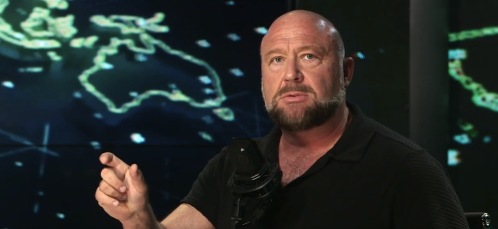After losing a series of defamation lawsuits over his false claims about the Sandy Hook school shooting, Alex Jones’s Infowars brand is headed to auction today. But this court-ordered sale marks more than just the dismantling of a controversial media platform. It represents a curious moment in American cultural history, where progressives and conservatives could find themselves scrambling to claim the audience of a man who turned late-night conspiracy radio into a multimedia phenomenon.
Jones wasn’t the first to tap into America’s appetite for alternative explanations. He emerged from a distinctly American tradition of paranoid broadcasting, following in the footsteps of Behold a Pale Horse author Bill Cooper, whose “Hour of the Time” broadcast warned of secret societies and Government plots throughout the Nineties, and Art Bell, whose Coast to Coast AM kept insomniacs company with tales of alien visitors and shadow governments. But where these predecessors remained voices in the darkness, Jones dragged conspiracy culture into the mainstream daylight.
His innovation wasn’t in the content — most of his theories were recycled from older sources — but in the delivery. Cooper broadcast from a shack in Arizona until his death in a police shootout. Bell spoke in measured tones about supernatural possibilities. The squat, powerfully-built Jones, by contrast, created a full-throated multimedia experience, complete with props, on-location broadcasts, and an ever-present sense of urgency in projects such as 2000 film Dark Secrets: Inside Bohemian Grove, which made his predecessors seem quaint by comparison.
What’s remarkable about the current moment isn’t just Jones’s temporary fall from grace — it’s the rush to fill whatever void he’s leaving behind with the brand. Progressive groups are floating plans to acquire Infowars and transform it into a fact-checking operation, with The Barbed Wire‘s publisher vowing to “unwarp the broken minds of friends and loved ones” and “excise damaging lies from history” (Jones would surely applaud the enthusiasm). Meanwhile, conservative figures speak of preserving the site as a kind of museum for alternative media, perhaps supported by the financial assistance of Elon Musk.
The battle over Infowars’ remains will prove intense. It’s not just about acquiring a website or a customer list — it’s about claiming the attention of an audience that has demonstrated its loyalty and purchasing power. Jones himself seems to understand this better than anyone. Even as Infowars heads to auction, he’s busy setting up new platforms and hinting at mysterious “patriot” buyers who might preserve his role.
After all, like the radio pioneers he followed, Jones has shown remarkable adaptability throughout his career. He evolved from a public access small-timer into a digital media mogul, survived deplatforming from major social networks, reasserted himself on X after Musk restored his account, and maintained his audience’s loyalty even after admitting in court that the Sandy Hook shooting was “100% real”. Now, despite bankruptcy and the loss of his flagship platform, he’s positioning himself for yet another transformation. In an era in which Donald Trump — once a guest on Jones’s show, and another powerful ally to have — has reclaimed the White House despite his own legal troubles, it would be premature to count Jones out.
Today’s auction, then, isn’t really about the end of Infowars or even Jones himself, who will surely continue to find ways of making his voice heard. It’s about the beginning of whatever comes next in America’s long tradition of alternative media. The question isn’t whether someone will fill the space Infowars occupied, but whether anyone can replicate — or perhaps further innovate — the peculiar alchemy that turned late-night questioning of official explanations into a highly profitable operation.











Join the discussion
Join like minded readers that support our journalism by becoming a paid subscriber
To join the discussion in the comments, become a paid subscriber.
Join like minded readers that support our journalism, read unlimited articles and enjoy other subscriber-only benefits.
Subscribe